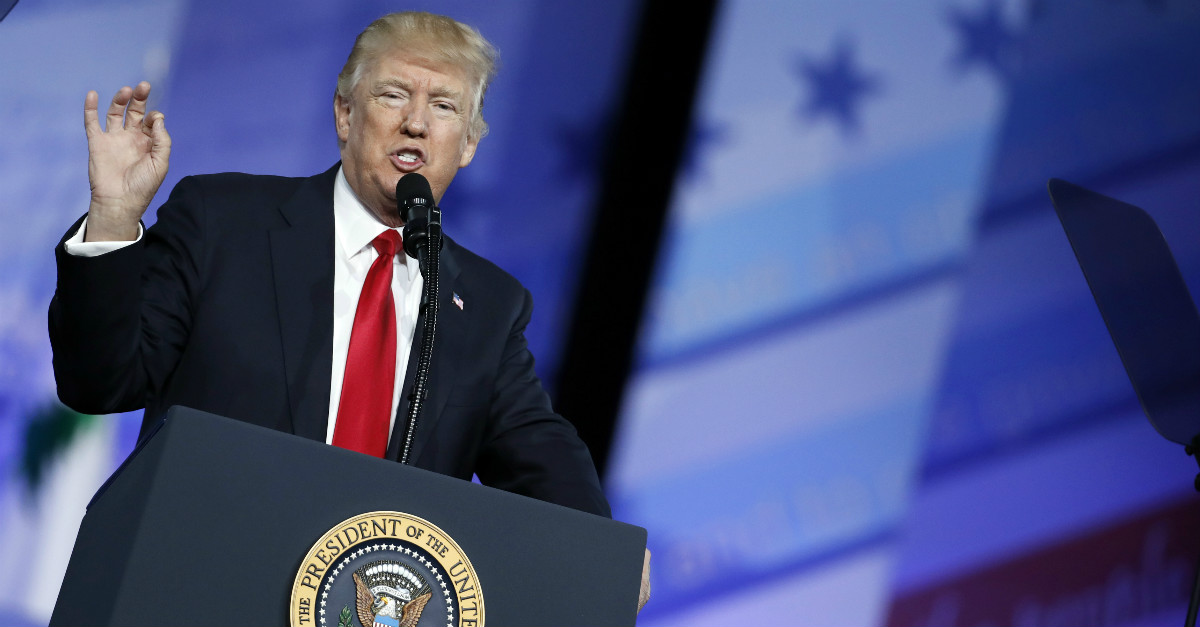“I want you all to know that we are fighting the fake news,” President Trump announced in his speech at the Conservative Political Action Conference (CPAC) on Friday. “It’s fake, phony, fake.”
Videos by Rare
After a pause for applause, Trump continued to warm to what has been a favorite theme throughout his campaign and early presidency. “A few days ago I called the fake news the enemy of the people. And they are. They are the enemy of the people,” he said, reiterating a recent tweet.
But from there Trump took a new tack. To date his complaints about the media have been just that—complaints, spitballing backed by no apparent plans for specific interference with the First Amendment’s guarantee to a free press. True, Trump has talked about “opening up” libel laws as a means of disciplining journalists he believes to be unfair, but defamation is legislated at a state level. As a federal official, Trump’s hands are tied.
RELATED: Trump’s address to Congress showed just how obliterated the Democrats are
At CPAC, though, Trump got specific. Journalists “have no sources,” he alleged. “They just make ’em up when there are none.” After a few minutes of meandering comments around this point, he added, “I’m against the people that make up stories and make up sources. They shouldn’t be allowed to use sources unless they use somebody’s name. Let their name be put out there. Let their name be put out.”
Mandate named sources, Trump said, an “you will see stories dry up like you’ve never seen before.”
Well, on that point, he’s right: Make it illegal for anyone to speak anonymously with the press and you will see stories dry up—stories of government incompetence, stories of corrupt officials, stories of covert criminality, and stories of constitutional abuses.
That isn’t a good thing. Anonymous sources have proliferated in recent decades because reporters saw their massive role in exposing the Watergate scandal. It’s true their use can be abused, but it is equally true that the American public would miss out on necessary and valuable reporting without these sources. Our government would be even more unaccountable than it is now.
(One time, The Washington Post tested a rule in which reporters could use a maximum of one named source per story. The rule was dropped within two days, because the paper’s “competitors, including the New York Times and the Wall Street Journal, published important news stories that The Post did not have. The paper’s readers were deprived of significant information.” Under Trump’s scheme, those important stories would never have been published at all.)
The unsurprising cherry on top of Trump’s dangerous CPAC proposal is that it is utterly, embarrassingly hypocritical. As journalists quickly noted, the president has a long history of citing anonymous sources himself—his birther-era tweets are rife with unnamed sources providing scintillating (and false) claims about former President Obama—and Trump White House officials anonymously commented to the press just two hours before Trump gave his CPAC speech. They were speaking in line with Trump’s agenda at an official White House briefing.
Early in his career, Trump even pretended to be his own PR man in conversations with journalists. There is audio of this, including a moment where he accidentally refers to himself in the first person, and in 1990 he admitted to this pretense in court. Perhaps our president feels he is an expert in fake news because he has personally generated it.
Of course, banning anonymous sources won’t stop actual fake news outlets, by which I mean the fact-free nonsense websites that literally make stuff up (sometimes they take the trouble to claim they’re writing “satire”) to generate ad revenue.
RELATED: Trump vows to rein in the FDA so Megan Crowley and others suffering can get the help they need
That these purveyors of misinformation would not be impeded in the least by Trump’s proposal should be obvious to anyone on the right: Just as gun control laws affect law-abiding citizens while criminals go along their merry way, so Trump’s anti-First Amendment agenda would muck up the works for real journalism while leaving the internet “satirists” unaffected.
The sort of writer who is amoral enough to make deception his business will not care about any anonymous source ban. In fact, unlike the journalists at the outlets Trump maligns, he probably writes anonymously himself.
At this point, I am reasonably confident Trump will not take concrete steps to prohibit anonymous sources, if only because his administration would lose a favored PR tool. Still, his eagerness to ignore journalists’ constitutional rights is troubling. “The First Amendment gives all of us…the right to speak our minds freely,” Trump said at CPAC. “It gives you the right and me the right to criticize fake news and criticize it strongly.” That’s true, but the president would do well to remember the First Amendment guarantees not just free speech but also free press.



